
Hot or Cool Institute is a public interest think tank that explores the intersection between society and sustainability, we bring together researchers and practitioners to facilitate solutions to global problems.

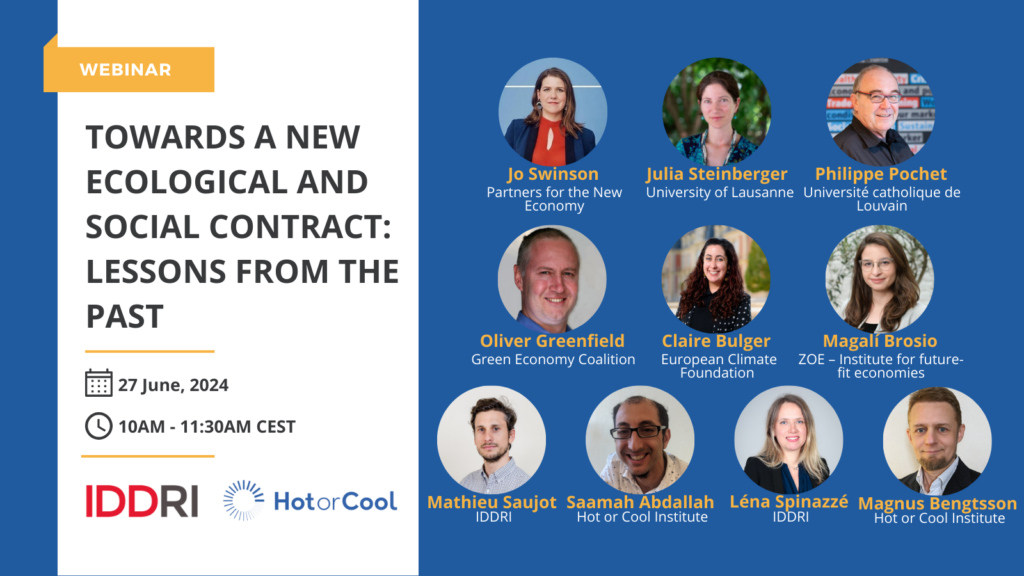
Democracies around the world are facing multiple crises. Social and political tensions over inequalities, cultural wars and the very fabric of democracy are growing, and attempts to tackle environmental challenges seem only to be fuelling the flames. Hot or Cool and IDDRI believe that our current social contract is key to understanding these problems–partly because it is not being fulfilled, and partly because it is not consistent with the transition to sustainable societies that we need for the 21st century. The transformation of lifestyles and economies needed to achieve such societies cannot be simply imposed on the public: it must be negotiated as part of a new social contract.
In this webinar, Hot or Cool and IDDRI will be presenting the results of our first report as part of a joint project funded by ECF on the social contract, entitled: How did we get here? A short history of the 19th and 20th centuries social contracts in France and in the UK.
We will be discussing the implications of the report for work on a new social contract, and how a new social contract can help us advance towards a sustainable society.
—————————————–
Special Guests
Jo Swinson (Partners for the New Economy and former leader of the UK Liberal Democrat party)
Professor Julia Steinberger (University of Lausanne)
Professor Philippe Pochet (Université catholique de Louvain and former General Director of the European Trade Union Institute)
Claire Bulger (European Climate Foundation)
Oliver Greenfield (Green Economy Coalition)
Magalí Brosio (ZOE – Institute for future-fit economies).

On the 2nd May, the Hot or Cool Institute is publishing the latest edition of the Happy Planet Index, the original indicator of sustainable wellbeing. As well as revealing which countries come closest to the goal of good lives that don’t cost the earth, the report will – for the first time – analyse differences between income groups within countries, to reveal which income groups are most efficient in terms of converting environmental impact into happy healthy lives.
We are delighted that WEAll (the Wellbeing Economy Alliance) is hosting the launch of the Happy Planet Index.
If you want to be among the first to see the latest HPI results, and find out what our plans are to move towards people’s measures of national success, join us on 2nd May.
SPECIAL GUESTS
Dr. Saamah Abdallah, Programme Lead Sustainable Wellbeing at the Hot or Cool Institute.
Rachel Laurence, Deputy Chief Executive at the Centre for Thriving Places.
The interconnectedness of care and climate crises is evident; a sustainable society necessitates an equitable and caring economy that prioritises both environmental sustainability and social well-being. This free online event will explore recommendations from Climate Outreach’s recent report on ‘Care-full climate communications’, focusing on the key recommendations for communicating the intersections of climate and care. This session will also give you an opportunity to hear from expert speakers, discuss this vital topic with others in the sector and ask questions.
We welcome researchers, activists, practitioners, funders, and policymakers who are working towards the transformation to fair, sustainable, care-centred societies.
SPEAKERS:
Nameerah Hameed – Engagement Advisor, Climate Outreach
Simon Ticehurst – Advocacy and Movements Lead, Wellbeing Economy Alliance (WEAll)
Join us using this google meet link.
We welcome researchers, activists, practitioners, funders, and policymakers who are working towards the transformation to fair, sustainable, care-centered societies.
To learn more about our work explore the Caring Societies Project.
The World Resource Forum 2023, taking place in Geneva, will propose an engaging and interactive programme to dive into some of the key topics around sustainable resource use, across the three conference tracks of sufficiency, value chains and digitalisation.
During the 3-days event, Hot or Cool Institute will join the panel debate titled “Sufficiency: from a consumer to a sufficient society”
The concept of sufficiency has been receiving renewed attention as an effective, if not indispensable, climate change mitigation strategy. However, it still remains a misunderstood and marginal concept, especially in policy and business environments. Can sufficiency become a powerful driver for innovative and equitable ways to deliver wellbeing for all, within planetary boundaries?
When: Tuesday, September 5th, from 9:00 AM – 10:30 AM.
Where: in Geneva or online – Register today here!
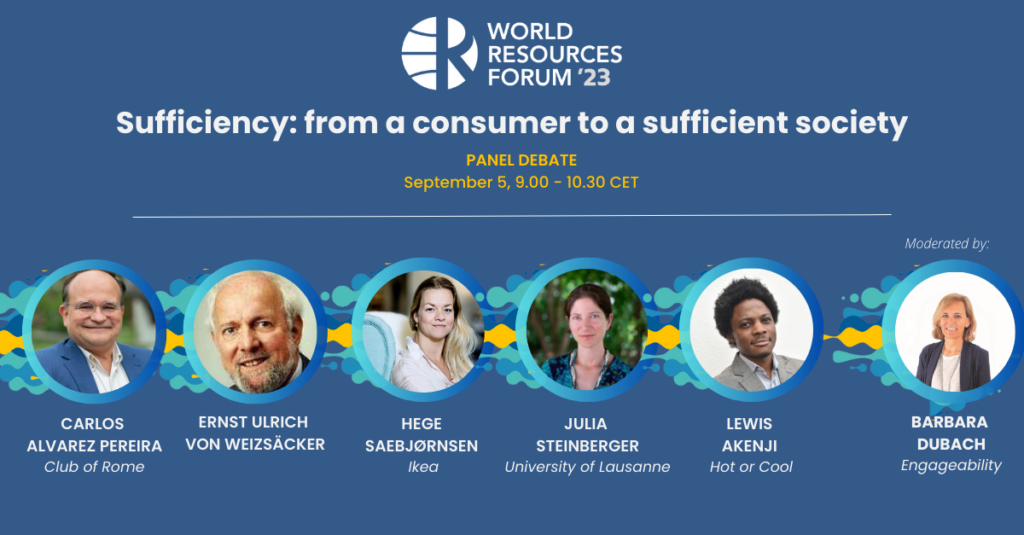
Speakers
The next meeting of the Forum for Caring Societies will feature Jana Vasileva, Coordinator of Participatory Action Research at Yo Cuido México presenting on “Insights from grassroots organizing for caring societies with unpaid care workers in Latin America.”
About the Forum
Communities working on ecological justice agree that putting care in the center of economy and society can cultivate a positive vision for change. Researchers, practitioners and activists all over the world are creating exciting projects and experiments that transcend the current system.
The Forum for Caring Societies offers a space for connection, co-learning and strength through joint action.
The Forum will promote radical eco-social transformation with care as the guiding principle The collaboration will be grounded in the decades of work undertaken by e.g., eco-feminist, decolonial and Climate Justice researchers and activists.
The first steps envisioned for the Forum include: 1) Creating a platform for collaboration, policy analysis, and peer learning, 2) Convening with funders to support transformation beyond the current system; 3) Effectively communicate complex issues related to caring societies.
We welcome researchers, activists, practitioners, funders, and policymakers who are working towards the transformation to fair, sustainable, care-centred societies.
To learn more about our work explore the Caring Societies Project.
Contact
To connect, find out more or join the Forum for Caring Societies, please contact us: care@hotorcool.org
From the 30th of May until the 2nd of June, the World Circular Economy Forum 2023 will gather forward-looking thinkers and doers and present the game-changers in the circular economy.
The Hot or Cool Institute will join the Consumers in a circular economy session with its Programme Lead, Luca Coscieme.
During the event, experts will (i) explore how to track global environmental impacts caused by European consumption and help European policy making, (ii) helps us understand how consumer behaviour can influence circular global value chains and (iii) illustrates examples where circular material sourcing can improve the environmental performance of a company.
When: MAY 30, 2023 AT 13:30-14:45 EEST (UTC+3)
When: 23 November 2022, 14:00 to 15:30 CET
Registration: https://bit.ly/JoinShiftingFashion
In less than a decade, Black Friday has become a global event, incentivizing overconsumption and impacting the environment. But we also see a growing movement to boycott Black Friday, with numerous brands refusing to participate in the discounts. The main question is, ‘How can consumer passion for a good fashion deal be harnessed for a sustainable future?’ This event will highlight that consumption change is where the most significant need and opportunity for sustainability lies. It will showcase speakers from the forces that influence consumption and shape aspirations, underscoring areas for hope and defining where we should focus our efforts.
The event will explore:
For whom?
This event is for all actors involved in the textile value chain; policymakers, the private sector (including SMEs), civil society, technical organisations, and interested individuals. The webinar is of relevance to all those communicating on sustainable fashion with consumer audiences. This includes agencies, fashion and news media, image-makers, digital platforms, influencers and educators, from Small and Medium Enterprises (SMEs) to multinationals worldwide.
Why is fashion critical to a sustainable future?
The textile and fashion industries are globally significant, providing economic growth, employment, revenues, and products essential to human welfare. Yet fashion is also central to human aspirations; what brands share influences what and how much we consume. The world is producing and consuming more textiles than ever, and the low reuse and recycling rates also mean more waste. The shift to circular business models is critical in delivering sustainability for the industry and requires global approaches ensuring a just transition with entirely new visions and radically different ways of doing business.
UNEP’s strategy for the fashion sector and textile value chain
UNEP’s strategy outlines the imperative for the fashion sector and the broader textile value chain to become “radically and rapidly transformed to become circular, including reducing consumption and production impacts whilst increasing the utility gained from each product.” UNEP’s upcoming sustainable fashion playbook highlights the role of consumer-facing storytellers and the power of shifting the narrative to strengthen demand for a positive fashion future. It focuses on leading with science, changing behaviours and practices, reimagining values and driving advocacy. This event will bring these strategies to life.
Organisers:

Agenda
14:00 Opening statements
14:15 Lead with science
14:20 Panel discussion
15:00 Questions and Answers session
15:25 Closing remarks: Elisa Tonda, Chief Resources and Markets Branch, UNEP (TBC)
Join authors Hot or Cool Institute and an exciting lineup of expert speakers for the online launch of the report: Unfit, Unfair, Unfashionable: resizing fashion for a fair consumption space.
Current fashion trends in consumption, and in particular fast fashion, cannot be maintained if we aim to achieve a fair and just transition to climate neutrality. Mounting scientific evidence now clearly reveals the vast extent of negative environmental and social impacts of fashion consumption, as well as the different responsibility of consumers in high- and low-income countries and groups.
The report contributes to filling the knowledge gap arising from most prevailing climate scenarios on fashion that underplay the potential contributions of lifestyle changes to climate change mitigation and instead focus entirely or mainly on developing new technologies and on changes in production.
Furthermore, the report assesses and exposes misconceptions in the climate impacts of practices often regarded as effective solutions for reducing the carbon footprint of fashion. Analysis of practices such as clothing donations and second-hand exports, reveal environmental impacts not often considered but that potentially shift their net environmental benefits to negative.
The report will be available to download on the 25th November.
Documentaries are a powerful means to inspire people and raise awareness of human rights violations.
The Human Rights Film Festival Berlin (HRFFB) is a hybrid on- & offline festival at the heart of the German capital, taking place from 13 – 23 October, 2022. For 10 days, the festival focuses on stories from all parts of the world that vividly address and reflect on human action, the socio-political status quo and fundamental issues such as democracy, justice, freedom and environmental protection. Through discussions and Q&As with filmmakers, activists and experts, the festival creates a platform to gain new perspectives on our world.
Hot or Cool is part of the 2022 edition, through participations in 1 workshop and 3 expert panels, namely at:
14 OCT – CLIMATE STORYTELLING Workshop
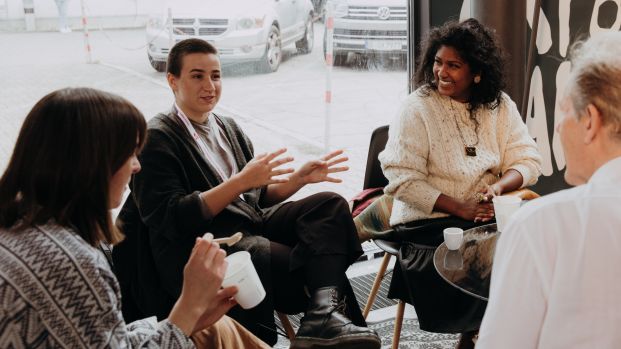
Since the 1970s, we have known that climate change is real, and researchers have been making recommendations for action since then too. But somehow politics and the general public have turned a blind eye to the issue for far too long. This workshop will offer researchers the basic tools to get them heard and reach critical audiences.
15 OCT – Above Water – Film talk and Q&A
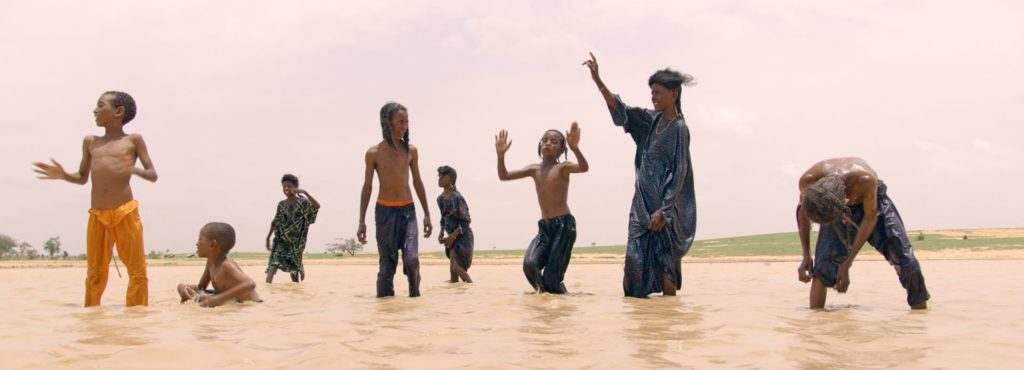
Film: Every day, twelve-year-old Houlaye walks many kilometers – not to school, but to fetch
water. She lives in the small village of Tatis in northern Niger and is one of about 2.2 billion
people worldwide without direct access to drinking water. She often has to stop her little
brothers from using the precious water to wash. And at drought time, Houlaye is completely
on her own: many adults leave their villages and families behind in search of new resources,
and Houlaye’s parents are among them. But all it would take is a well to provide access to
water and a better life for everyone, because two hundred meters below the dry ground,
there is a spring of unimaginable dimensions.
Speakers:
Ben Unterkofler (Founder share)
Diogo Silva (Hot or Cool Institute)
Host: Clara-Sophie Cantagrel (Manager Projects Afrika)
Film talk
We will talk about the effects of the climate change on access to drinking water and the risks
for people not having access to it. What options do we have in the Global North and what
impact does our consume?
17 OCT – DON’T STARVE OUR FUTURE Forum
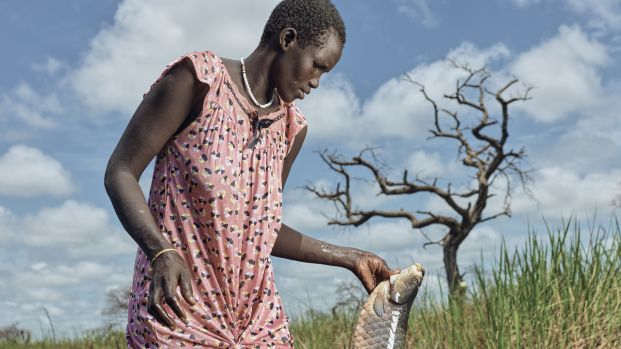
With increasing emissions, our planet is moving closer and closer to catastrophic tipping points that are threatening to throw the climate off balance. But around the world, people are fighting to avert this catastrophe, reaching positive tipping points instead – tipping points that will allow all people to live on a healthy planet without hunger. Using examples of climate action, grassroots activism and the application of Indigenous knowledge, we will discuss what the climate movement and aid organisations in the Global North can learn from climate activism in the Global South – and vice versa. We are looking for fresh, unconventional alliances to jointly pave the way out of climate-related hunger. Join us and become part of the movement!
Keynote: Dr. Kira Vinke (German Council on Foreign Relations)
Panellists:
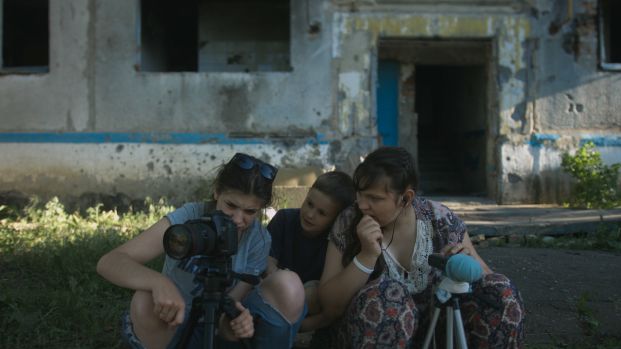
Are we as a society still able to talk to each other without getting loud and insulting or feeling hurt just because someone doesn’t share our point of view? How can we find more common ground? We would like to initiate an intensive discussion on how to combat disinformation and misinformation, what can be done to counter propaganda and how data and facts can be communicated in such a way that they cannot be misinterpreted or misused.
How the digital societal transformation is related to the challenges of social justice and ecological sustainability is still far too little discussed. One thing is clear: the way in which new technologies are designed and used has a major impact on a large number of social and ecological challenges of our time!
How and by whom must digital technologies be designed so that they contribute to a democratically led, far-reaching transformation? Which social and ecological goals should be pursued in particular? Which forms of digital technologies urgently need to be redesigned because they perpetuate the unsustainable status quo of intersectional discrimination, social polarization and the destruction of our livelihoods? And how do they have to be designed and used to tackle the climate crisis?
Our Managing Director Lewis Akenji will answer these and more questions during the opening session at @ Bits & Bäume, a conference for transformation digitalization and sustainability, hosted by the Technische Universität Berlin.
The session will start with keynotes by Elisa Lindinger and Lewis Akenji. Afterwards, the Bits & Baeume board, represented by the environment and development organisation Germanwatch and the tech organisation Open Knowledge Foundation e. V., will discuss with Dr Christiane Rohleder, State Secretary at the Federal Ministry for the Environment and Consumer Protection (BMUV) and Dr Franziska Brantner, Parliamentary State Secretary at the Federal Ministry of Economics and Climate Protection, what needs to be done now politically to make sustainable digitalisation a reality.
Tickets are still available, grab yours here!
https://lnkd.in/ekwqWTA9